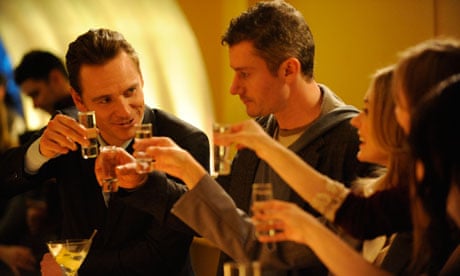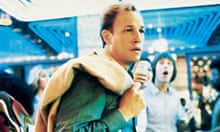Three years ago the British artist Steve McQueen, winner of the 1999 Turner prize and famous for his film installations, made a remarkable feature debut as the director of Hunger, an account of the hunger strikes in Ulster's Maze prison in the early 1980s that culminated in the death of Bobby Sands. It was a chamber movie of Bressonian austerity that only briefly moved outside the jail block and ignored the tactical and political activities of the IRA leaders. His new film, Shame, as intense, expressive and physically controlled as a clenched fist, also stars Michael Fassbender, the protean actor who played Sands, and is also strikingly photographed by Sean Bobbit.
This cold, objective film, co-scripted by the playwright Abi Morgan, who collaborated on The Iron Lady, is at once intimate and remote. Both revealing and concealing, Shame centres on the handsome Brandon (Fassbender), a successful senior employee of a smart company in a gleaming office, the precise activity of which is never specified. He lives a comfortable life in a clean, cold, anonymous flat in a high-rise apartment block overlooking the river from midtown Manhattan. We first encounter him in an extended sequence with scarcely any dialogue as he travels by subway to the office, making eye contact with a pretty girl sitting opposite him. (In an early McQueen installation called Bear, two naked men, one of them the artist himself, exchange ambiguous silent glances.) As the journey progresses there are flashbacks to the previous night when Brandon entertained a call girl at his flat, and the sequence ends with him following the strange girl off the train and either losing her or being given the slip. Was he truly attracted to her? Was it a compulsion or a ritual? Is this the everyday eroticism of New York?
To many males Brandon's life might seem pretty attractive, if only as a source of fantasy. But gradually a downside emerges. His attitude to sex is curiously obsessive, lacking in joy. He masturbates day and night, watches pornography on his computer, screws anything that stands still long enough or will accept money. Unlike his immediate boss, who's a charming philanderer when not being a responsible family man, Brandon doesn't seem interested in conquest or erotic pleasure. He is, however, neither a clinical case history in satyriasis and sex addiction, nor some glib, patronising metaphor for bland metrosexual Manhattan man. The only facts divulged about his background are that he was born in Ireland, raised in New Jersey and has a sister, Sissy (Carey Mulligan), a troubled drifter with singing ambitions. Uninhibited and desperate for some sort of stability, she moves uninvited and unwelcome into Brandon's apartment.
With great dexterity McQueen and Morgan develop two parallel, seemingly complementary narratives, one involving Sissy, the other Marianne (Nicole Beharie), a secretary at Brandon's office. The latter is an independent African-American woman, amusing, sensible, and in the process of getting a divorce. For reasons we can only guess at (McQueen does not recognise our right or need to know anything), Sissy is a danger to Brandon and his rejection of her is brutal. She is clearly extremely talented, as she demonstrates in a piano bar where she performs a sensational, painfully felt slow version of "New York, New York", though he refuses to acknowledge this. When she goes to bed with his boss within half an hour of meeting him, Brandon becomes incandescent. But his reaction to her promiscuity is to take a chastening midnight run across Manhattan from the East River to the Hudson along 28th Street, shot in a single long take of extraordinary beauty.
In the other narrative strand, less immediately problematic, Brandon appears to be therapeutically engaged. He takes Marianne out to dinner at a smart-casual restaurant, and a night of relaxed banter reveals his distrust of enduring relationships as well as his innate kindness and his indifference to food, drink and other aspects of fashionable good living. Are we invited to infer that a certain shallowness of character and sensibility might be a cause or a symptom of his problems? We hope that this relationship will lead somewhere. Everything, however, heads towards the shame of the title, a horrendous journey to the end of a night of degradation, self-destruction and punishment. All is shot phantasmagorically out of sequence as Brandon provokes a jealous barroom bruiser into beating him up, has an encounter in a grim place of gay assignations, and takes part in an orgy. At the end nothing is resolved, and after the scars on his cheeks fade away, another cycle of hope and shame begins.
Shame is a disturbing film that penetrates our minds and gets beneath our skins as we try to understand its characters. Fassbender confirms his reputation as one of the most courageous and versatile actors to emerge in recent years. His Brandon is a creation of immense complexity, a prisoner trapped in an invisible cage of his own making and rattling the bars. Is he angrily wondering whether the key is buried in his past or concealed about his person? Carey Mulligan is equally good, and more obviously vulnerable than her brother to those around her. Their spiritual and physical nakedness makes one think of the famous payoff line that used to conclude each edition of the legendary TV series about New York: "There are eight million stories in the Naked City. This has been one of them."







Comments (…)
Sign in or create your Guardian account to join the discussion